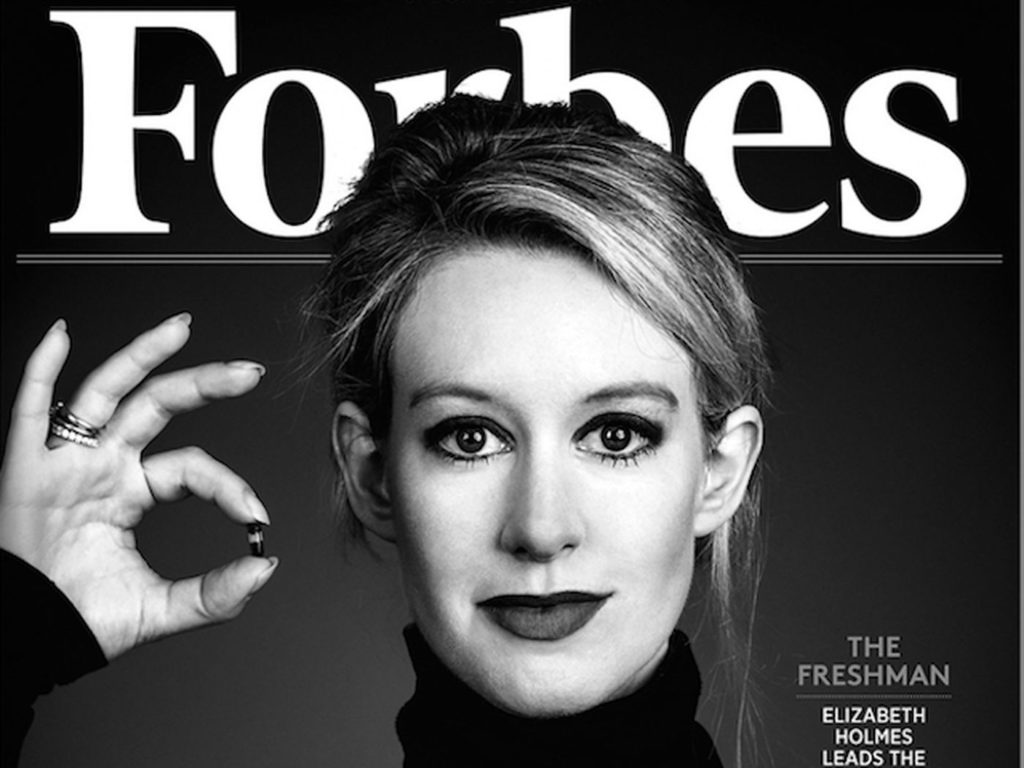If you’ve ever heard Elizabeth Holmes speak – during interviews she did as the founder of Theranos or via the audio recordings that emerged during her fraud trial – you’ve likely heard the confidence in her voice.
She is convincing in her language, her tone, and fast responses. Even when, as we now know, she was telling outright lies about the capabilities of the business she founded, Theranos, and its blood-testing capabilities via the testing device the company invented, The Edison.
Holmes raised hundreds of millions of dollars from some of the world’s most powerful people using this confidence, including Rupert Murdoch (who lost US$125 million when the company collapsed) and Henry Kissinger. She became a sought-after speaker on the tech, health and innovation circuit, was featured at the centre of countless business stories and became the youngest female billionaire to feature on the Forbes Rich List. A university dropout, she was labeled as the next Steve Jobs, and styled herself as such: wearing a black turtleneck every day as a means of “eliminating clothing choices” and focusing on the work.
Now found guilty of four charges related to fraud, Holmes is set to receive a very long prison sentence given each such charge carries a maximum of twenty years.
Theranos was started by Holmes at the age of 19 with the aim of revolutionizing blood testing. By 2014, she claimed they were able to “run comprehensive laboratory tests” from just a few drops of blood. She spoke then about protecting the “health and wellbeing of every person, of those we love” as a basic human right, and how fast and simple blood testing could help address the debilitating costs of healthcare in the United States.

Theranos signalled a future of no more needle tests, testing facilities available in retail outlets – such as Walmarts – and the possibility that one day we’d simply be able to run our own tests from our own personal testing machine. It seemed a far stretch, but tech entrepreneurs have brought other once thought remote tech opportunities into our home: such as the personal computer.
But when Wall Street Journal journalist John Carreyrou published his first investigation into Holmes and the validity of Theranos’ testing capabilities, thanks to the help of some courageous whistleblowers and scientists, the Theranos story started to unravel, investors pulled their money and the company eventually collapsed.
One of Holmes’ most convincing tactics was storytelling. She spoke constantly about the health issues in her own family including an uncle who passed away before she could say goodbye, as well as a fear of needles. She once described traditional blood collection as “torture”.

Holmes spoke of a dream that so many wanted to be a reality, which is why her storytelling was so compelling – especially when it was combined with the potential for investors to cross the intersection of health and tech and get in early on the technologies they believed would revolutionise how we manage getting sick.
The now much-discussed 2014 TED talk that Holmes gave speaking about health as a human right and imagining a world that we all wanted to live in, has been removed from the TED platform, with Reddit forums now dedicated to finding and sharing it.
The courage of Erika Cheung
Erika Cheung’s TED talk is much more worthy of your time and still very much available on the platform.
Back in 2014, while working with Theranos, she made a discovery that would ultimately lead her to become a whistleblower and speak truth to power.
Her talk is candid and humble. Rather than pushing the ‘fake it till you make it’ and ‘confidence is everything’ mantras that have become so central to the entrepreneurial world, she speaks of truth and having the courage to step forward for the good of everyone.
She also speaks of resilience: growing up in a one-bedroom trailer with six family members and going on to graduate from Berkeley with a dual degree in molecular and cell biology and linguistics.
As a grad, Cheung raised numerous internal concerns with the methods Theranos was using for testing its devices: to the chief operating officer and to a board member, just as Holmes was being featured on the cover of major magazines across the country. Cheung questioned if the problem was her. “Maybe there’s something that I’m not seeing? Maybe I’m the crazy one.”
Meeting journalist Carreyrou, she says was “luck”. He told her that far from being crazy, she was one of the numerous people who were seeing the same problems and concerns and who were just as scared of coming forward. While Carreyrou was carrying out his investigations and before the WSJ published its first piece, Cheung says Theranos went after her and others, including by following her. She made a decision to write a complaint letter to regulators noting the deficiencies she’d seen in the laboratory.
“As endearingly as my dad kind of notes this as being my, like, dragon-slayer moment, where I had risen up and fought this behemoth and it caused this domino effect, I can tell you right now, I felt anything but courageous. I was scared, I was terrified, I was anxious. I was ashamed, slightly, that it took me a month to write the letter,” she said.
“I still did it, and luckily, it triggered an investigation.”

Erika Cheung’s advice
Cheung has a warning about “moon shots” in innovation and particularly entrepreneurship – those highly ambitious projects that have the potential to change the world that everyone wants to believe in.
She doesn’t want the pursuit of moon shots to end, but rather for them to be developed in safe and open environments.
“But what happens when the vision is so compelling and the desire to believe is so strong that it starts to cloud your judgment about what reality is?” she says.
It’s in these projects particularly, that it can be difficult for people who see deficiencies, to speak up, particularly when a charismatic leader is involved.
That’s why Cheung says that fostering a culture of where people can speak up and will be heard is essential.
Such a culture will not only identify deficiencies in a product, especially where public safety is concerned, but will also identify deficiencies in leadership, in culture and highlight toxic environments that might be hindering the confidence, careers and mental wellbeing of everybody.
Cheung spent hours testifying on the stand during Holmes’ trial on the failure rate and data manipulation she witnessed with Theranos’ key blood lab machine, the Edison. “It was concerning to see this degree of failure, this was not typical for a normal lab,” she said.
She is now an advocate for ethics in the tech industry and has launched a non-profit called Ethics In Entrepreneurship. On the same day as Holmes’ guilty verdict, Cheung published a piece on how regulatory reforms could be leveraged in the United States to provide universal access to contraception.
Confidence and charisma is no doubt helpful in entrepreneurship, but ultimately having the courage to tell the truth is everything.


